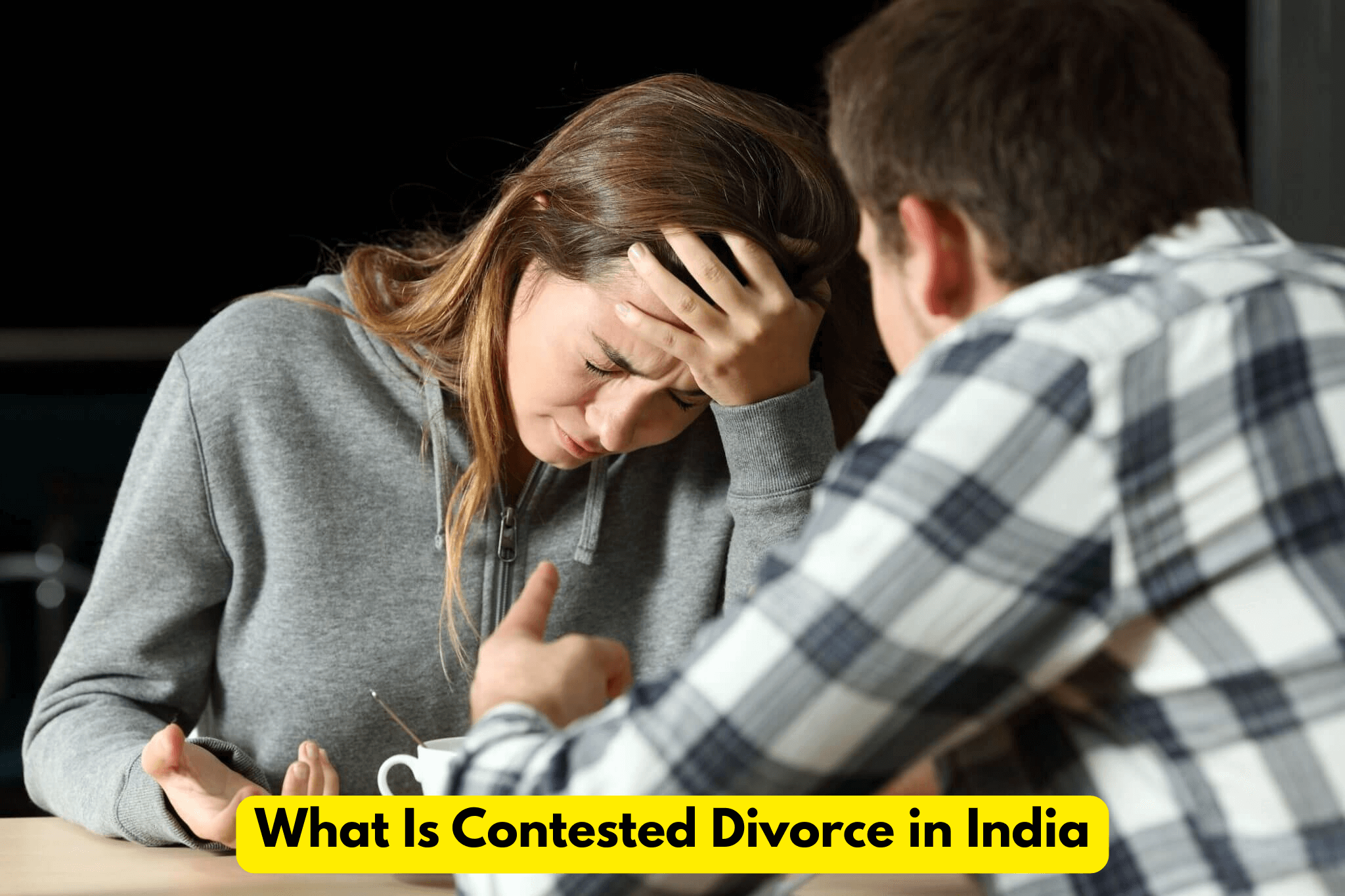Are you looking to know What Is Contested Divorce in India? Then, Read this article to find out What Is Contested Divorce in India

Contents
What Is Contested Divorce in India
The separation that is most frequently witnessed in India is a contested dissolution. People are gradually choosing to leave unhappy marriages and enter healthier ones as they become aware of their unpleasant reality.
Ending the relationship is challenging! Relationships that might be harmful to your bodily and emotional well-being are also prohibited. Any disagreement between the parties involving the division of property, custody of children, or alimony qualifies as a contested divorce. They must ask the court for assistance in those situations in order to dissolve their marriage.
Contested Divorce Grounds
The circumstances for the divorce must be stated in a valid petition that is submitted to the appropriate court. Nobody is allowed to file for separation in a court lacking sufficient grounds (legal grounds). And now let’s examine the legal justifications for petitioning for a contested divorce.
Cruelty
At first, cruelty wasn’t really considered a valid reason for divorce. But now that the Hindu Marriage Act of 1976 has been amended, it is regarded as a legal basis for a contested divorce in India. Cruelty can easily be linked to negative effects on the body and the mind. It could cause the particular spouse to either direct or indirect threats. Most divorce proceedings in India are granted on the basis of cruelty, or when a husband or woman physically abuses their spouse.
Adultery
A valid cause for requesting a divorce on behalf of the partner that wasn’t engaged is when one spouse engages in sexual activity with another individual other than their spouse. They must support the partner’s accusation on this premise. Since it can be difficult to find precise evidence in certain situations, the most likely proofs can be taken into account.
Desertion
In the most basic terms, desertion may be described as a long time of neglect on the side of one spouse by the other. It is impossible to assume on the desertion ground for a contested divorce if this neglect is a result of their consent. If the petitioner could show there was nothing left among them other than sharing a roof, this might also be a viable reason for their separation.
Conversion
Another reason for a contested separation in India is the change in one spouse’s beliefs. However, not all laws recognize this to be a legal justification. Although being recognized as a valid ground under the Hindu Marriage Act of 1955, the dissolution of the Muslim Marriage Act of 1939 as well as the Special Marriage Act of 1954 don’t really regard it as a valid reason. This privilege only applies to those who were coerced into converting to another religion; it does not apply to those who are already members of that religion.
Mental Illness
If an individual’s psychological health cannot be improved and is deteriorating day by day, there is a legal basis for the spouse to request a divorce from the marriage. It could be interpreted as a situation where the partner or spouse is unable to manage themselves. If a spouse wants to apply for divorce on the basis of mental illness, they must first establish that condition.
Infectious venereal diseases
In addition to these reasons, there are several other grounds upon which any spouse may file for a contested divorce. Impotence, the husband’s detention, leprosy, inability to pay support and a few more things are examples of these potential grounds.
There were specific documents that had to be included with the appeal when it was filed for a contested divorce. The following documents must be submitted in order to file a contested or unilateral divorce:
- Wedding certificates or photographs
- Both a husband’s and a wife’s Aadhaar cards
- Invitation to Marriage Card
- Proof of a year-long separation
- Proof of the unsuccessful attempts at peaceful coexistence
Procedure for Contested divorce
A disputed divorce takes a lot of time to get. In India, the process for a contested or unilateral divorce is as follows:
Submitting a court petition
The petition for divorce, along with all the associated papers and justifications, constitutes the initial stage in requesting a contentious divorce in India. A copy of this appeal must be provided to the local Family court. The partner or spouse of the other party then receives the notification of the contested divorce.
Reply in opposition to the Notice
The spouse or other party who obtained the separation notice now must draught a response to the charges brought against them or her. If the spouse doesn’t, it is assumed that they have accepted all of the accusations and the decision-making process will continue.
Courtroom trials
The court establishes schedules for witness hearings, cross-examination of the respondents, and filing of all responses and counter-response. Divorce attorneys from both parties present their final statements upon the conclusion of the evidence.
Final Decision
The court issues the final decree of divorce after hearing all the opinions and scraps of evidence, regardless of whether separation is allowed or denied.
FAQ’S
Where Should a Contested Divorce Petition Be Filed?
The plea for contested divorce may be submitted to the family court in the city where they previously shared housing, also including their marital house, the location of the wedding, or the place where the wife now dwells.
How do you seek a divorce in India?
Well with aid of professionals, filing for a contentious divorce in India is the easiest process. Listed below are a few causes:
To prosecute or oppose a divorce case in a contentious divorce, you need an experienced divorce attorney. Such a knowledgeable divorce attorney will direct, plan, and organize the entire process. Proper trial preparation by divorce attorneys raises the likelihood of a successful outcome.
A contested divorce is a protracted process that calls for expertise and a professional mindset. With his knowledge and your guidance during a stormy and traumatic time, a qualified divorce attorney tackles these difficult jobs.
How long does a divorce case last that is contested?
Divorce proceedings might take several months or even years to complete. Although, disputed divorce cases are typically resolved in three to five years by the courts in an effort to hasten trials and reduce paperwork.
Do check this page for good divorce lawyer in bangalore to handle your divorce case smoothly
About the Author – Advocate Priya Narayan

Advocate Priya Narayan is a seasoned divorce and family law attorney based in Bangalore, with over 12 years of courtroom experience. She has represented 500+ clients across a wide range of matrimonial cases — including divorce, child custody, alimony, domestic violence, and mutual consent petitions under Hindu, Muslim, Christian, and Special Marriage Acts.
Her deep understanding of personal laws, combined with real courtroom insights, helps clients navigate complex legal situations with clarity and confidence. Advocate Priya is known for her strategic litigation skills, empathetic client approach, and a strong track record in achieving favorable settlements both inside and outside the courtroom.
Office located in: Indiranagar, Bangalore
Email: contact@bestdivorcelawyerinbangalore.com
Phone: +91-9361722724
This article is based on her legal understanding and practical experience in Indian family courts.
Need guidance on your case? Schedule a confidential consultation with Advocate Priya Narayan.